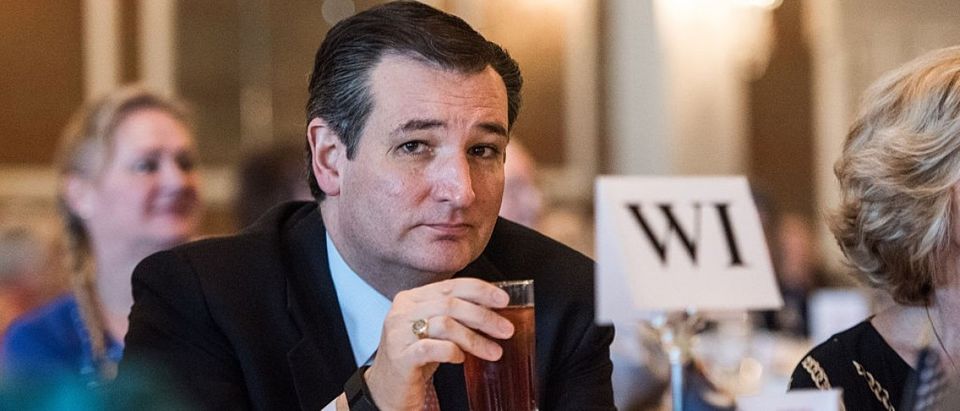The very idea is anathema to Cruz supporters. Didn’t he win the Iowa caucuses? Isn’t he the only GOP candidate yet to defeat Donald Trump? And who else but Cruz can hold the line on “amnesty” and a host of other bedrock conservative issues?
Yes, but it’s time for Texas’s freshman senator to face some facts. After three straight losses — the most recent of them to Marco Rubio as well as to Trump, his campaign is fading fast. You can see it and hear it in his dejected post-election “victory” speeches in South Carolina and Nevada. Cruz gamely tried to suggest — all appearances to the contrary – that he’s still winning the battle for the nomination. But even the candidate doesn’t look or sound like he believes it anymore.
Make no mistake: Cruz is still in contention in some key states that hold primaries next Tuesday. He’s in first place in Arkansas and is running neck and neck with Rubio in Minnesota. But the contest in his home state of Texas – with a treasure trove of 177 delegates, almost 15 percent of the total needed to win – may be the clearest sign yet that Cruz is in deep trouble.
Until recently, Cruz had a double-digit lead in the Lone Star State – but not anymore. The latest poll places Cruz, Trump and now even Rubio – who is surging fast — in a statistical dead heat. Maybe Cruz will rally, but Texas is Bush country, and after Bush’s withdrawal, most of Bush’s people have swung behind Rubio. A Rubio victory would completely alter the narrative of the GOP race – that Trump is unstoppable. And it would make it completely untenable for Cruz to continue.
But what if Cruz manages to squeak by? That may pose a far bigger problem for the GOP. Why? Because it will stoke Cruz’s determination to continue a race that he cannot win. If Cruz waits too much longer to withdraw, Trump will win a plurality in most of the contests in the South on March 1 and 15th. That will place him firmly on the march to winning the nomination.
The evidence from recent contests puts the lie to the argument that Cruz can unify the GOP. He has a firm hold on many of the party’s most conservative voters, but has proven unable to break out and capture other groups. Pulling out a squeaker of a victory in Texas will not alter these campaign fundamentals in the slightest.
Contrast Cruz’s performance to that of his rivals. Rubio is surging because he is winning over Tea Party conservatives, national security conservatives, and especially moderate evangelicals. Kasich has a strong base among party moderates, which he parlayed to great advantage in New Hampshire. Trump captures elements of all party sectors — conservatives, evangelicals and moderates. Cruz remains trapped within his uber-conservative orbit.
In fact, Cruz has never really tried to break out. His entire campaign is premised on conservative ideological “purity” — but that’s not the top concern of most GOP voters. True, they aren’t looking for conservative betrayal, either — one reason that Bush failed so miserably after embracing amnesty and Common Core. But most Republicans are open to a candidate who will shake up Washington but also has the skills to maneuver and to get things done. They realize that some compromise will be required. Cruz, who has demonstrated a willingness to hold the GOP-controlled Congress hostage and to damage the Republican brand with the general electorate for personal gain, doesn’t seem to fit the bill.
Cruz’s battles with Rubio and Trump seem only to have diminished his stature. In a decisive showdown with Trump, he accused the billionaire real estate mogul of having “New York values.” The implication was that Trump was not a “true” conservative but harbored strong sympathy for liberalism. Trump demolished Cruz during this exchange, and even had Cruz clapping. It was the debate equivalent of wrestling’s “two-point reversal,” and Cruz has never really recovered.
In fact, Cruz has only damaged himself further by employing ugly campaign tactics and persevering in them even in the face of exposure and criticism. It started in Iowa, with the spreading of false rumors about Ben Carson’s “withdrawal” from the race and the use of phony election documents. It’s continued with fraudulent robo-calls intended to embarrass Trump, and with grossly misleading claims about Rubio’s political record.
Whatever short term advantage Cruz may have gained – in Iowa above all—from these tactics, they have all but disqualified Cruz as a viable GOP standard-bearer. GOP voters are looking for a pugnacious fighter and a party unifier but increasingly Cruz comes off like a clever and under-handed hatchet man who genuinely relishes the dark side of political life.
Cruz isn’t the only GOP candidate that might consider withdrawing. And he has every right to soldier on through March 1 to try to win his home state. But if Cruz is truly intent on seeing Trump defeated for the nomination, he needs to realize that his own candidacy is making that task harder, not easier. That’s not a pro-Rubio or pro-Trump position. It’s simply the facts.


